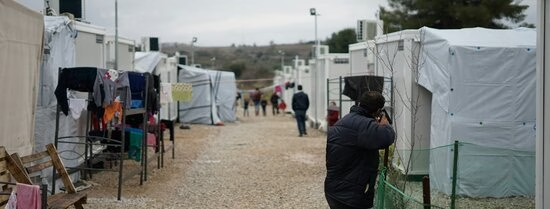On the occasion of the 5th anniversary of the UN's Global Compact for Migration, the International Institute of Social Studies (ISS) and the GAPS Project co-hosted the online launch of the Journal of Refugee Studies Special Issue titled 'Irregularized Humanitarian Migrants—Policies, Rationales, and the Search for More Durable Solutions', guest-edited by Dr Zeynep Kaşlı, Dr Marieke van Houte and Dr Arjen Leerkes.
Humanitarian migrants in focus
This online event, 'Where are we on durable solutions for irregularized humanitarian migrants', delved into the challenges humanitarian migrants face in navigating the co-occurrence of protection and enforcement gaps. Building on existing critiques of this forced-voluntary binary and aiming to go beyond it, the special issue embraces a migrant-centred, rather than legal-policy, perspective that considers multiple forms of insecurities that make people move out of their homelands.
Watch the recorded stream

Summarizing the launch
After a short introduction from the Special Issue co-editor Dr Kaşlı and contributors, During the launch, Dr Zeynep Sahin Mencütek from the GAPS Project welcomed the special issue and contributions as a valuable addition to critical scholarship on migration. Emphasizing the need to shift debates toward a migrant-centered perspective, Dr Mencütek highlighted the contributions' conceptual richness and methodological diversity.
The discussion focused on the potentials of amnesties and regularization schemes as durable solutions for irregularized migrants. Participants emphasized aligning these schemes with migrants' best interests rather than solely catering to labour market needs, political landscapes, governance structures and socio-cultural factors. The risk of perpetuating hierarchies of deservingness based on ethnic, racial, or cultural resemblances was underscored.
A key takeaway was the need for a shift in emphasis from where durable solutions are found to how they are implemented. Mobility emerged as a crucial aspect, with examples shared by participants and speakers suggesting that lasting solutions may require facilitating disconnection and increased mobility. The discussion urged policymakers to recognize mobility as a natural response to unsafe environments. It stressed the importance of aligning policies with people's mobility needs.
The event, attended by 90 viewers from various universities, international non-governmental organizations (INGOs), and state departments worldwide, concluded with gratitude to the contributors and participants for their valuable insights.
“Introduction: Irregularized Humanitarian Migrants—Policies, Rationales, and the Search for More Durable Solutions” by Marieke van Houte, Zeynep Kaşlı and Arjen Leerkes
“At the Crossroads between Care and Control: A Cross-Country Comparison of Assisted Return” by Rossella Marino, Arla Mannersuo, Inês Francisco and Ine Lietaert
“Safe for Whom? A Human Security Perspective on Nigeria as a ‘Safe Country of Origin’” by Xander Creed, ZeynepKaşlı and Shyamika Jayasundara-Smits
“Who Owns the Future of Syrians in Lebanon? Intimate Family Explorations of Refugees’ Own Search for Durable Solutions” by Maybritt Jill Alpes, Kwamou Eva Feukeu, Marieke van Houte, Shahed Kseibi and Belal Shukair
“The (Non-)Status of ‘Duldung’: Non-Deportability in Germany and the Politics of Limitless Temporariness” by Theresa Schütze
“De-Bordering Solidarity: Civil Society Actors Assisting Refused Asylum Seekers in Small Cities” by Iraklis Dimitriadis and Maurizio Ambrosini
“(Non-)deport to Discipline: The Daily Life of Afghans in Turkey” by Sibel Karadağ and Deniz Ş Sert
“Departing or Being Deported? Poland’s Approach towards Humanitarian Migrants” by Witold Klaus and Monika Szulecka
“From Dadaab Camp to Kismayo City: A Call for Local Evidence to Inform Durable Solutions” by Charlotte Mohn, Francesco Tonnarelli, Jonathan Weaver, Winston Njuguna and Abdirahman Barkhadle
- Assistant professor
- Related links
- Governance of Migration and Diversity track

